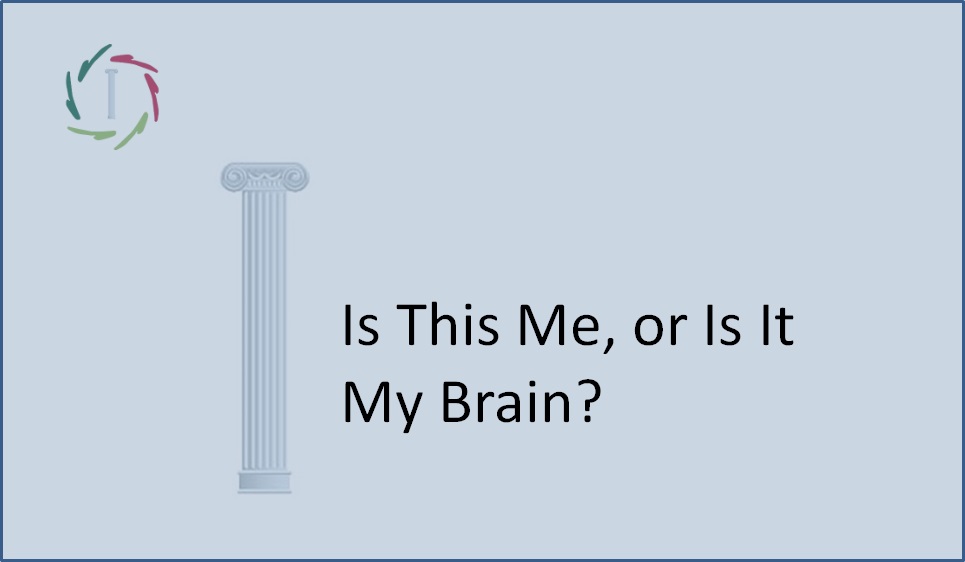14. Is This Me, or Is It My Brain?

I use my brain, but who is ‘I’ without a brain?
Is a brain an instrument of ‘I’?
If this is the case, then is ‘I’ a kind of homunculus that is present somewhere in a separate box in the brain? In the Middle Ages it was thought that this was indeed the case. For a long time one thought to have found the box in the pineal gland, a little organ of which one did not quite know its function. We know better meanwhile but in a way, the idea of the homunculus did survive.
It’s in the culture. It’s in the popular media.
Most people think as if there would actually exist an ‘I’ , separate from the brain. An ‘I’ that, who knows, hopefully, will survive the brain. The brain that is used by ‘I’. The brain that may be ill or deficient, regardless of ‘I’. “I can’t help it. It is my brain. My brain makes me smoke. My brain makes me eat excessively,” is not far away then… As a result, one loses a possible sense of guilt, and unfortunately in addition to this also responsibility and self-reliance.
Peculiar thinking
Perhaps the cause is to be found in an ever increasing selfishness/self-centeredness. Maybe it’s rather the result of a fear response resulting from the idea that the ‘I’ in all materialism could ever disappear, swallowed up by matter. Maybe it’s precisely the result of a boundless materialistic view that in the background has already got rid of ‘I’. Anyway, I (indeed) see more and more peculiar thinking popping up in the media about the relationship between ‘I’ and ‘my brain’. Some examples of how this is literally expressed:
– “I feel good” becomes “My nucleus accumbens is stimulated by a dopamine flow.”
– “I think you’re beautiful” becomes “My sexual brain centers are getting a boost.”
– “A mother loves her child” becomes “The oxytocin is flowing.”
The right side of these examples is always correct, and at the same time totally off.
I (yes, I) like to use the analogy with a painting to explain this. A painting consists only of paint, a cloth and a framework. Take these ingredients away and the painting is gone. So there is nothing else but that. However, the most important thing has been forgotten, namely the art. Without the art, the painting has little relevance. Forgetting the art is the result of a materialistic reduction. However, art is also present when the painting is present.
Similarly, ‘I’ am present when, roughly speaking, my brain is present. If ‘I’ would lose some pieces of my brain, e.g. by atherosclerosis, then it’s clear that some pieces of ‘I’ will get lost. Of course, it is not that ‘I’ ‘have’ my brain. But even so it is not the case that ‘I’ ‘am’ my brain. The art is not the sum of the material elements of the painting.
In case of a criminal, it’s even more striking
Is it so that a criminal has a kind of ‘minimal brain dysfunction’, making that his brain takes control over him? ‘Who’ committed the murder, she or her brain? Could the aggressive moods of this gentleman be the result of testosterone fluctuations? If one makes the brain fit the bill, ‘I’ seems to be rather an additional victim than the perpetrator. Then even the very idea of guilt would no longer be correct. The question of guilt is, after all, the question of conscious guilt, where ‘I’ is acting as an independent source of choices. Whether the brain would be a tool of a conscious homunculus or consciousness dispersed in the brain, if something was wrong with that instrument, then there is no doubt about it: no guilt and thus no penalty.
I myself cannot think of an instant solution to this problem.
It seems as if the concept of ‘guilt’ has no explanatory place in a realistic human context.
Just a functional place thus, a way to keep society running. That is, of course, obvious if one looks at the origin of the legal system a few thousand years ago, for example. ‘Guilt’ is only present in perception. That makes it no less real as operating means. Chronic feelings of guilt, however, have a significant impact on certain aspects of health. It is therefore important that we, in no case, allow unjustified guilt induction. There is yet a great deal to be done in this.


